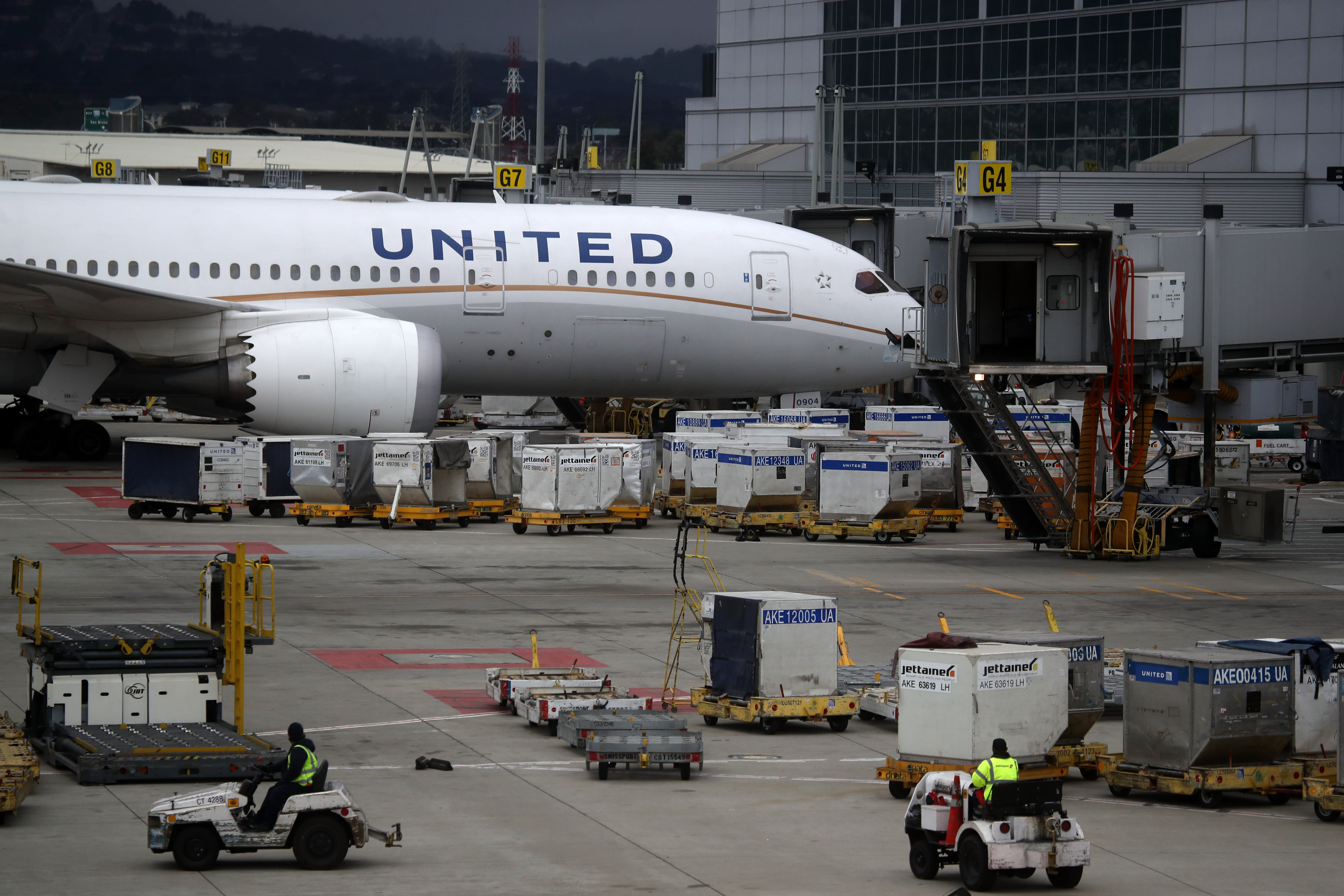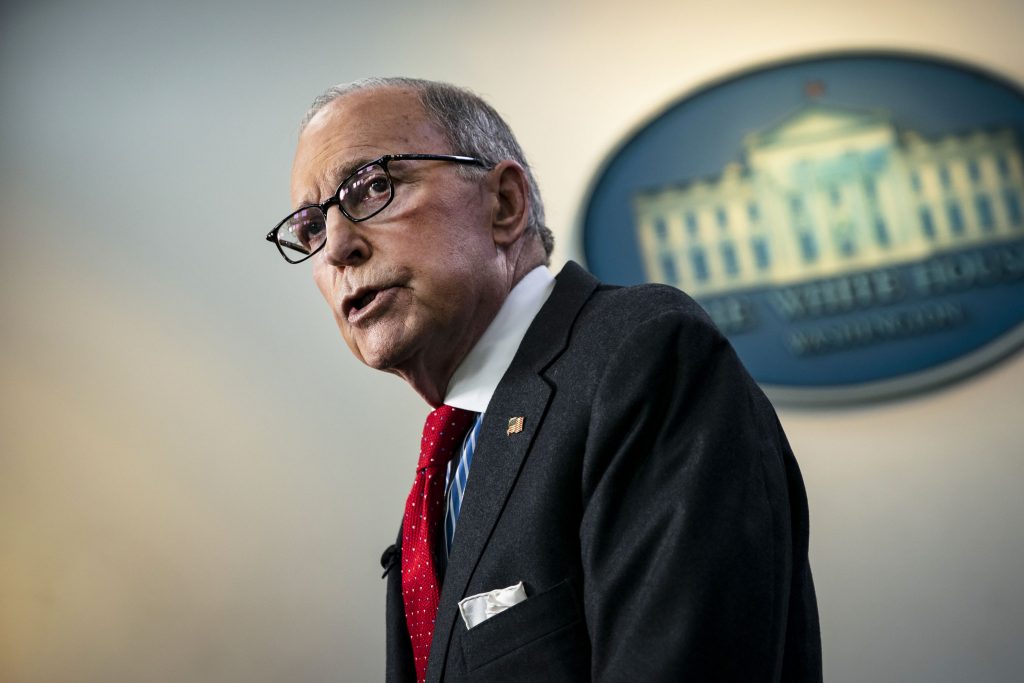
A United Airlines plane sits parked at a gate at San Francisco International Airport on March 06, 2020 in San Francisco, California.
Justin Sullivan | Getty Images
Congress is scrambling to put together a third coronavirus relief package − and lobbyists are flooding the phones.
Lawmakers this weekend are pushing to meet the White House’s Monday deadline of coming to an agreement on a rescue package likely to top $1 trillion. On Saturday, White House Economic Advisor Larry Kudlow said the package would likely equal 10% of U.S. economic output, or more than $2 trillion. Executives have zeroed in on language in Senate Republicans’ initial proposal allocating a portion of those funds to Big Business.
The proposed bill funnels $50 billion to airlines, $8 billion to cargo air carriers, and $150 billion for other “distressed businesses” — a category it leaves notably undefined. But companies have no interest in leaving the definition of “severely distressed business” up to Treasury.
Meantime, there’s a game of chicken going on in Congress of who will be the person to cause the delay that allows the collapse of bedrock American companies.
United‘s CEO warned the government this week that if it doesn’t get aid by the end of the month, it “will begin to take the necessary steps to reduce [its] payroll in line with the 60% schedule reduction we announced for April.”
As the time bomb ticks, Congress must sift through the requests. The hotel industry wants $150 billion. The restaurant industry wants $145 billion. The National Association of Manufacturers wants $1.4 trillion. The International Council of Shopping Centers wants a guarantee of up to $1 trillion.
“The bailout requests are mind-boggling,” said Dennis Kelleher, chief executive of advocacy group Better Markets. “And it’s going to be a matter of who’s going to win and who’s going to lose.”
President Donald Trump said in a press conference earlier this week he’s not picking winners, just keeping American jobs by protecting the largest employers. And most industries have argued it’s not a bailout. They argue the situation is unprecedented, and the pain they are confronting is not their fault.
“Take post 9-11, post-financial crisis– double it – and it’s still not there,” said American Hotel Lodging Association CEO Chip Rogers said. AHLA’s members include Wyndham Hotels, Marriott, Hilton, as well a number of small businesses.
Rogers, along with industry executives, met with Trump earlier this week to plead their case. Since February, U.S. hotels lost $2.4 billion in room revenue. In the Washington, D.C. Willard Intercontinental, there were four guests this week.
But a rescue of the hotel industry may not flow down to its suppliers, who have also spent the week arguing their case.
“There are a lot of good cases to be made and a lot of intense lobbying to have your industry to get in the mix,” said Aaron Cutler, a partner at Hogan Lovells. “There are so many secondary sectors that are impacted beyond just hotels and casinos: airline part suppliers, seafood industry supplying the fish and seafood to restaurants, meatpacking industry and so forth.”
The International Foodservice Distributors Association has estimated the industry will lose $24 billion if the shutdown persists over the next three months. Hotels are empty, restaurants have shut down aside from takeout, and schools have told students to stay home.
“We’ve always been the silent partner, and members of Congress don’t always know who we are” said IFDA CEO Mark Allen. “We’re not asking for a handout, we just want to keep our employees.”
Airlines and aerospace don’t need to argue they’re essential – and they don’t need to introduce themselves to Congress. Lawmakers on both sides of the aisle of the economy have acknowledged their critical role as a means of transport, as a buyer of equipment and an employer of 750,000 jobs.
Still, lawmakers don’t want to be questioned by voters about a decision to bail out an industry in which the four biggest companies have collectively spent about $39 billion over the last five years buying back shares. They will also have to explain supporting Boeing, which is still reeling from the two crashes of its 737 Max plane that killed everyone on board.
And so, they’ve begun to indicate their terms.
Democrats have called for any company that gets federal aid to ban corporate buybacks. President Donald Trump said Friday he would “order” it. Senate Minority Leader Chuck Schumer said Trump told him in a phone call that he opposes companies using bailouts to buy back stocks. the
By late Friday, Boeing announced it will cancel CEO pay, suspend its dividend and extend a pause on share buybacks.
Other potential concessions may be harder for Boeing and the airlines to swallow.
The airline industry would prefer its proposed $50 billion in relief half in grants and half in loan guarantees. Boeing has requested for itself and its suppliers $60 billion funded in part through loan guarantees.
But Trump had indicated he may want to offer aid in the form of an equity stake, a move that would dilute shareholders and give the government stricter oversight. It would also give the government a chance to make a profit, as it did after its 2008 bailout out of banks and automakers.
The idea of equity stakes has some support in Congress, people familiar with the situation said. Still, Republicans are divided over whether the potential profit is enough to justify getting back into the business of private companies, they said
And as lawmakers squabble over how, and whether, to help the countries’ biggest industries, the crisis has already arrived on Main Street. Unemployment claims next week could total three million, Bank of America said this week. There are workers without insurance and paid leave, and hospitals that are understaffed and low on essential equipment. There are local governments that need support. The U.S. conference of mayors has requested $250 billion.
Democrats have made clear they want any bill they pass to take care of those without protections, believing that helping the nation’s largest employers isn’t enough to ensure workers and those without a job are also taken care of.
“We need to address this as the public health crisis it is, and the people who are most directly impacted— health-care workers, families, communities, small businesses—must be put first, not big corporations,” said Democrat Sen. Patty Murray from Washington in a statement.
House Speaker Nancy Pelosi has said that any bill Congress passes must increase unemployment insurance, expand paid sick and family leave and put money directly into the hands of those who need it most.
Amid the requests and mounting need, many in D.C. believe this package is not the last. Some call it a “triage” with another, potentially even bigger, to come later down the line.
When asked at a conference earlier this week whether a trillion is enough, Trump responded: “We’ll know about that later — we’ll see what happens,” he said.
— CNBC’s John Schoen contributed to this report

